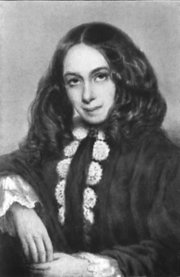"How do I love thee?", began, by far the most famous poem written by Elizabeth Barrett Browning and definitely with one of the most famous opening lines in poetry.
I chanced upon this lovely poetry while in Udaipur, where I completed my medical studies. It was one of those lazy Sundays when I would go to Franklin's room with the Times of India in my hand, to read the Sunday newspapers. Duhoma would join us, bringing the Hindustan Times. Franklin of course has the Indian Express. Franklin and Duhoma - my batchmates in R.N.T Medical College, Udaipur and my partners in crime. Having different newspapers was our ploy to ensure those lazy Sunday afternoons pass by without making us feel too bored. On one such Sunday afternoon, Duhoma came in holding a piece of paper in his hand which bore the impression of having been carefully torn from a newspaper. He showed us the poem by Elizabeth Barrett Browning, the wife of the famous English poet and playwright, Robert Browning (1812 – 1889).
I felt the poem radiates with the intense love Elizabaeth had for her husband. The choice of words she used spoke of her character and the values she believed in. If any lover were to present his or her beloved a gift, it should be this poem.
Elizabeth Barrett Browning (1806 – 1861) was a member of the Barrett Family and one of the most respected poets of the Victorian era. Elizabeth Barrett was born on March 6, 1806 in Durham, England. She was the eldest of twelve children of an autocratic father who forbade his children to marry6. Elizabeth began writing at a very young age, publishing her first works while in her teens.
From an early age Elizabeth suffered a chronic lung ailment. She spent most of her time in a darkened room writing poety and many letters. The famous English poet Robert Browning admired her "Poems" (1844) so much that he wrote to her. They met, fell in love, and were secretly married in 1846. Soon after their marriage they ran away to Florence, Italy, where Elizabeth began a remarkable physical recovery.
In 1849, they had a son, Robert Wiedeman Barrett Browning. She increasingly took up contemporary issues including the Italian Nationalist cause, the abolition of slavery in the United States, and the position of women in Victorian society. Elizabeth died on June 29, 1861. Many critics agree that Elizabeth's best poems appear in Sonnets fromt he Portuguese, a series of 44 sonnets recording the growth of her love for Robert Browning.
Browning is generally considered the greatest of English poetesses. Her works are full of tender and delicate, but also of strong and deep, thought. Her own sufferings, combined with her moral and intellectual strength, made her the champion of the suffering and oppressed wherever she found them. Though not nearly the equal of her husband in force of intellect and the higher qualities of the poet, her works had, as might be expected on a comparison of their respective subjects and styles, a much earlier and wider acceptance with the general public.
Mrs. Browning was a woman of singular nobility and charm, and though not beautiful, was remarkably attractive. The English novelist and dramatist, Mary Russel Mitford thus describes her as a young woman: "A slight, delicate figure, with a shower of dark curls falling on each side of a most expressive face; large, tender eyes, richly fringed by dark eyelashes, and a smile like a sunbeam."
Browning's most famous work is 'Sonnets from the Portuguese', a collection of love sonnets. Sonnet number 43 from this collection is the the poem that formed a part of the history of Browning's own love-story.
How do I Love Thee
How do I love thee? Let me count the ways.
I love thee to the depth and breadth and height
My soul can reach, when feeling out of sight
For the ends of Being and ideal Grace.
I love thee to the level of everyday's
Most quiet need, by sun and candlelight.
I love thee freely, as men strive for Right;
I love thee purely, as they turn from Praise.
Most quiet need, by sun and candlelight.
I love thee freely, as men strive for Right;
I love thee purely, as they turn from Praise.
I love thee with the passion put to use
In my old griefs, and with my childhood's faith.
In my old griefs, and with my childhood's faith.
I love thee with a love I seemed to lose
With my lost saints,—I love thee with the breath,
Smiles, tears, of all my life!—and, if God choose,
I shall but love thee better after death.
With my lost saints,—I love thee with the breath,
Smiles, tears, of all my life!—and, if God choose,
I shall but love thee better after death.
For more information please see the links below:

No comments:
Post a Comment